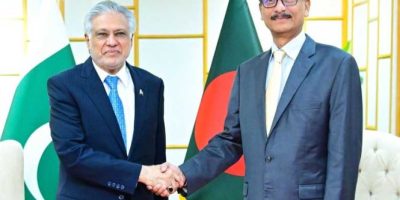Experts term nutrition integration with WASH critical for healthy population

ISLAMABAD, FEB 6 (DNA) – Nutrition integration has become a critical challenge that must be responded through the right policies and actions at every level including in social protection and early education. A holistic approach would be a key to respond to this need to ensure a healthy population. The experts from academia, civil society, and private sector, shared this viewpoint with the participants at the webinar ‘Nutrition integration for social protection and early education,’ organized by the Sustainable Development Policy Institute (SDPI) here Thursday.
Head of department public health, Dr Shahzad Ali Khan, termed malnutrition as a huge problem in the country and said that Pakistan has placed in stunting growth index on 2nd number after Afghanistan which is a quite unfortunate fact. He added further that the worst in all indicators of stunting, wasting, underweight and exclusive breastfeeding.
He added further that minimum acceptable diet, meal, and minimum diet diversity in Pakistan is poor in both terms of quality and quantity and hence, it must be improved.
Department of Early Childhood Education, Allama Iqbal Open University (AIOU), informed the participants that the ECE worked closely with Pre-schooling in earlier years as it is an important positive element that will make it easier to develop problem solving skills.
Senior Research Fellow, SDPI, Dr Shafqat Munir, was of view that to create resilience in people both financially and infrastructure outlook is important to manage social-economic issues. He added further that social integration protection can be achieved by creating equal opportunities and equity space in risk and crisis management.
Focal Person for Nutrition, Ehsaas and Poverty Alleviation & Social Safety Division, Dr Rozina Khalid, enlightened the participants that EHSAS Program has been addressed Nashunuma Programme with human capital development to materialize the pillars of malnutrition and stunting.
While highlighting different aspects of the initiative, she said that three years pilot interventions are included in the plan with the help of shared work done by Provincial health, WHO and Agha Khan with steering committee already upscale the better services.
Aliya Habib,Focal Person Nutrition International, emphasized that highlighting other indicators beyond just the malnutrition are important at policy level and work for their implementation. She added further that the collective integrated policy document needed by both health and education sector.
Head of Gates Foundation family planning and advocacy, Dr Yasmeen Qazi, on the occasion highlighted that birth Spacing, and mother child health is important subject in terms of nutrition which cannot be separated from women cause. The trend that males do not accept contraceptive further adds to this problem, she said and added further that pre-marriage counselling for young adolescent girl and information about life cycle approach is also needed, she said.
Dr Danish Irshad, Advocacy Advisor, International Consultant Nutrition International, was of view that advocacy efforts should be focused upon the most important issues such as malnutrition, social protection and agriculture, water and sanitation and education to improve the existing situation. Media and think tank could play vital role in expansion of the importance of nutrition education, he concluded.
While highlighting social aspects of the issue during an earlier session, Dr Imran Khalid, Research Fellow at SDPI, termed water, sanitation, and hygiene issues of social justice. Along with food availability, he said, we need to focus on food fortification as well keeping in view the situation of malnourishment in the country.
Dr Nausheen Anwar, from IBA Karachi, while citing some revelations from a recent study, said that the research shows how poor sanitation and scarce availability of water is having direct impact on the women and children. She said that “the water supply mafia in Karachi has been very much entrenched and has added to the existing woes of water and sanitation in the city.”
Head of Programs, Water Aid, Mr Munawar, informed the participants water and sanitation is directly linked with various SDGs. He termed it unfortunate that only 30% Population in Pakistan is having access to clean drinking water.
Ms Akhter, Nestle Pakistan, was of view that we need an integrated approach to improve the overall nutritional value of our food and lifestyle.
“Working in silos and isolation, will not give the required results,” Ms Akhtar remarked and added further that we need to educate people that how they can ensure that they are drinking clean water and develop water recycling methods at local levels.
Shahid Minhas, Head CLD-SDPI, earlier, elaborated that at the time when the whole world is grappled with the pandemic, the issues of water, sanitation, and hygiene must remain priorities areas to del with for their impacts on overall health of population.=DNA
===============
Related News

Pakistan, Bangladesh resolve to bolster ties in various sectors
ISLAMABAD, JAN 25: Pakistan and Bangladesh have expressed their resolve to further strengthen ties acrossRead More

Zhao Shiren lauds Mohsin Naqvi’s role in Pakistan-China friendship
LAHORE, JAN 25 /DNA/ – Federal Interior Minister and Chairman Pakistan Cricket Board, Mohsin Naqvi,Read More


Comments are Closed